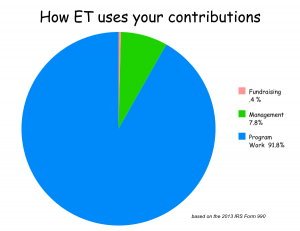EarthTrust Organizational Information
MISSION STATEMENT
We strive to make the earth a better place for wildlife and mankind by tackling “impossible” environmental issues that others have given up on, repeatedly failed at, or never properly understood in the first place. We do this by bringing together donors who are passionate about wildlife saving with equally passionate, experienced and innovative strategists and advocates. The formation of these “impossible missions” teams often creates a better, more whole future.
TAX STATUS
EarthTrust is a a 501(c)3 nonprofit U.S. corporation which was incorporated in 1976.
It has maintained U.S. tax-deductible status continuously for the life of the organization.
That “jedi” thing…
ET campaigns an programs owe much of their flavor to the advocacy theories of its founder, who has lived a lot of environmental history and has dedicated the organization to the “impossible missions” which so urgently need doing.
Bang for the Buck
No, the graph’s not wrong. Not only do we have a track record that’s nearly unbelievable, we do it without high overhead.
Earthtrust FAQ – Frequently Asked Questions
CLICK HERE to go to the ET FAQ page for illumination and clarification.
EarthTrust is unusual in a number of good ways.
Focus:
EarthTrust has an international focus, engaging with and frequently solving world-scale problems which have proven intractable to others. It’s regional programs can be wonderful, but they are always part of a global overview and strategy. With ET it’s “Think globally, act globally”.
Location:
EarthTrust goes where it’s needed at any given time, based on the issues it has committed to. It’s central administrative and executive office has always been in Kailua, Hawaii. It has had campaign offices in Auckland, Geneva, Honolulu, Kuwait, London, Los Angeles, New York, San Francisco, Washington DC, Taipei, Tokyo; ; as well as field workers in many other areas. These offices are opened and closed based on campaign needs. no office is kept open unless it is needed for one or more specific campaigns.
Philosophy:
EarthTrust is based on valuing and preserving the earth’s evolved life systems as we humans inherited them. Its methods are informed by the scientific method, and directed by pragmatism and an ethic of responsibility for the earth’s future.
This means a planet with rainforests and ice caps, seas of fish, whales and other complex, stable-environment (K-type) species. A planet with the biological carrying capacity and stable climate to feed a stable population of humans without wiping out other species.
Structure:
ET is structured with a small board of directors and a large number of advisors, to enable pulling together information quickly and adjusting course to deal with real-world crisis and opportunity. This is melded with long-term stability of executive management.
Physically, EarthTrust is organized electronically, and therefore not inherently limited. It doesn’t own buildings, ships, planes or other hard assets, though it rents or charters such things as needed to accomplish program goals.
The organization is literally run out of a network of electronically networked home offices, which is the most logical way to structure such an organization in the 21st century. ET pioneered this sort of structure and was written up many times in the early days of the internet, for doing impossibly cool stuff on low budgets and low overhead.
Overhead:
The overhead of the organization is ridiculously low compared with many other organizations, so low as to raise your eyebrows. Most organizations would have to cook their books to get anything like our real numbers. We have volunteer administrators, we spend next to nothing on fundraising, and there are very few fixed overhead costs. Why would anyone do it differently?
Funding Philosophy:
ET creator DJ White was also a founder of Greenpeace in the USA and internationally. His experience at the top levels of those and other groups caused him to want to do things differently with ET. Most nonprofit fundraising has extremely high costs associated with it, often high enough that the fundraising barely breaks even. This is especially true of mass mailouts and hiring professional fundraisers. For that reason, ET does not conduct mass mailings and has shut down any funding project that doesn’t produce a high percentage return, so you can be assured that a high percentage of your donation will go directly to saving species you love. ET has no paid fundraisers of any kind. Its philosophy is based on respect for the intelligence of its sophisticated donors, and respect for their contributions. If you aren’t inspired by our methods and our success, we don’t deserve your contribution.
Leadership:
The organization has extremely stable leadership over the years, while maintaining the ability to make quick strategic decisions and campaign pivots at the board level. The guy who created the organization in 1976 still directs it today, and his personal history coincides with a lot of environmental history being made.
Contact information
ET’s headquarters is at:
EarthTrust
Windward Environmental Center
1118 Maunawili Road
Kailua, HI 96734 USA
ph: (415) 662-3264
FAX: (206) 202-3893
email: dw@earthtrust.us
tax ID number: 99-0172970
ET Organizational Information at a Glance
- EarthTrust is a USA nonprofit corporation incorporated in Hawaii in 1976.
- EarthTrust is a tax-deductible 501(c)3 organization in good standing. Its tax ID number is 99-0172970
- EarthTrust was incorporated in 1976 by DJ White and the initial board. DJ White has been the president & chief strategist since the organization’s inception.
- EarthTrust has a relatively small board of Directors, and larger boards of advisors.
- EarthTrust is primarily run on volunteer labor, though does pay program managers and staff when there is a defined mission which requires it.
- EarthTrust exists as a network of home offices and campaign offices. There is no permanent physical structure. Campaign assets such as offices, ships, and laboratories exist to serve the needs of programs but do not outlive them.



